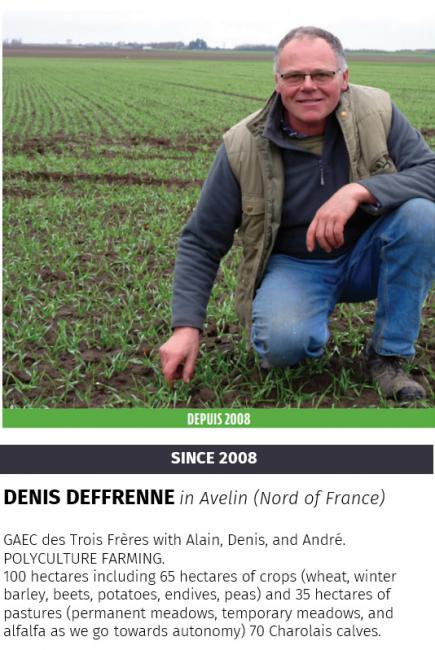
Denis Deffrenne
The pH is better, more balanced over the different layers of the soil. The rooting is more important
Crop/Production
Denis Deffrenne is a polyculture farmer in Avelin. His farm covers 100 hectares, including 65 ha of crops (wheat, winter barley, beets, potatoes, endives, peas) and 35 ha of pastures (permanent meadows, temporary meadows and alfalfa as we go towards autonomy) 70 Charolais calves.
Product/Usage
- Bactériosol concentré (since 2008) / to inhance the quality of crops and pastures<
Testimonial

At the “Gaec des Trois Frères”, everything is a go. Quality of production, soil structure, disease resistance, cost per hectare, nothing in the world could force Denis to go back.
"About ten years ago, we did a BACTERIOSOL test on a field that was going to be expropriated. I then tried on other fields, and then the whole farm. The first four or five years we have not mention that we use this concept for fear of what people say. Today we tell everybody.
Even on drenching soils, the soil is looser, lumpier. I always trapped moles and I quickly realized that the galleries did not hold well because the earth was less compacted. Every year we change something. There are temporary meadows that are 7/8 years old and have received nothing but BACTERIOSOL.
The pastures are doing well. On legumes, we no longer add nitrogen. You never feel like you have grass and yet animals always eat. The grass is shorter but much denser and much richer. There are far fewer scrubs. I put 95 units of mineral nitrogen per hectare whereas before on a mowing meadow we put 250 and 120/150 on a permanent pasture.
The meadows remain green despite drought and there are varieties such as clovers which return in abundance
"No more sclerosis or erwinia on endives". In potatoes, everything went to the factory at a good price. In the region, things are not going too well with the endive growers, while with us it is going well. In terms of diseases, we no longer have sclerotia or erwinia. Samples were taken from chicory. Compared to the averages at the cooperative, with us there was more protein, more minerals, more dry matter. In terms of taste, we match the earth endives. In peas, I am always with the best at the factory. Always a few more quintals. In wheat I reduced nitrogen by 40%. I went from 180 units to 110 units.
We are putting less herbicides, less fungicides and we have also stopped the shorteners. When management consultants make comparisons, they see that we are well placed in endives as well as in grain and that my cost per hectare has dropped. For the herd, we have been sowing manure and slurry with BACTERIOLIT for three years. Before, I used 30 tonnes of manure per hectare while now I have dropped down to 18/20 tonnes. Nothing would make me go back. It is obvious that we are going in the right direction.
If we compare soil analysis from ten years ago to today, we have a much more balanced soil and we have increased the rate of organic matter. We did a soil profile on the farm. The earth is much more mixed and there are many more earthworms even if we are on drenching soils. The pH is better, more balanced over the different layers of the soil. The rooting is more important, and the decomposition of organic matter is clearer. Contact with SOBAC's sales representative is essential. We exchange, we visit the fields. I travel miles to go to SOBAC meetings and I always come back richer and more determined. To use the SOBAC concept, you must be a little rebellious, not to be afraid of the gaze of others”.
Results
=> Fewer endive diseases, better quality
=> More aerated, less compacted soil
=> Less herbicides and fungicides
=> Richer grass, with fewer scrubs
=> Better resistance to drought
=> Nitrogen reduction by 40%
=> Better rooting
=> Better pH

